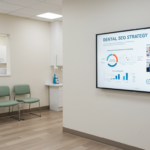
What Is Off Page SEO in 2025: Complete Guide
Off-page SEO is a key part of search engine optimisation (SEO), making up about 50% of what search engines look at in 2025. It’s about doing things outside your website to make it more visible and trustworthy to search engines. This guide will cover the basics of off-page SEO, its growth, and the best strategies for 2025.
Key Takeaways
- Off-page SEO involves activities outside a website that can improve its search engine rankings
- Backlinks, domain authority, and brand signals are crucial off-page SEO factors in 2025
- Leveraging social media, guest posting, and local SEO optimisation can enhance off-page strategies
- Measuring and monitoring off-page SEO success is vital for ongoing optimisation
- Avoiding black hat techniques and integrating PR with digital marketing are essential for long-term off-page SEO success
Understanding Off-Page SEO Fundamentals
Off-page SEO is about improving your website’s ranking through activities outside your site. It includes link building, social signals, brand mentions, and content marketing. Knowing these key areas is essential for boosting your online presence and authority.
The Core Components of Off-Page Optimisation
The main parts of off-page SEO are:
- Backlink Acquisition: Getting quality backlinks from trusted sites is crucial. These links show search engines your content is valuable.
- Social Media Marketing: Using social media to share and engage can create social signals that help your ranking.
- Influencer Outreach: Working with industry experts can get you brand mentions and high-authority backlinks, boosting your online image.
How Off-Page SEO Differs from On-Page SEO
On-page SEO improves your website’s content and structure. Off-page SEO, on the other hand, focuses on building credibility and authority outside your site. This external effort is key because search engines value a site’s trustworthiness and reputation when ranking it.
The Evolution of Off-Page Techniques
Off-page SEO has changed a lot in recent years. Link building is no longer just about quantity. Now, it’s about getting high-quality backlinks from trusted sources that add real value to users.
What Is Off Page SEO in 2025
Off-page search engine optimisation (SEO) is becoming more important for businesses. By 2025, it will focus on making a website more credible and visible. This means more than just getting links.
Off-page SEO in 2025 will be about building a strong online presence. It involves using social media, creating brand signals, and getting quality backlinks. The aim is to make a website trustworthy and user-friendly, which search engines value.
Off-page SEO will also link closely with digital marketing. Content marketing, public relations, and influencer work will help drive traffic and improve rankings. This way, businesses can tell a clear story and be seen as leaders in their field.
Local SEO and managing online reviews will also be key. For businesses targeting local customers, being seen in local searches is vital. Positive reviews can greatly help in off-page SEO in 2025.
In summary, off-page SEO in 2025 will be about a whole, strategic approach. It’s about being credible, authoritative, and user-friendly. This will help businesses succeed in the changing search landscape.
| Key Factors | Importance in 2025 |
|---|---|
| Backlinks | Continued emphasis on quality over quantity, with a focus on earning links from authoritative and relevant sources. |
| Social Media Signals | Growing influence of social engagement and brand visibility on search engine rankings. |
| Brand Mentions | Increased recognition of “implied links” through brand citations, even without hyperlinks. |
| Content Marketing | Strategic content publication on third-party platforms to enhance inbound link profiles and industry credibility. |
| Online Reviews | Significant impact on local SEO and overall brand reputation, requiring proactive management. |
As search engines get smarter, the best off-page SEO in 2025 will focus on real, lasting digital marketing. By taking a multi-faceted approach, businesses can attract more organic traffic and lead their industries.
The Critical Role of Backlinks in Modern SEO
In the world of search engine optimisation (SEO), backlinks are key. They help decide how high your website ranks in search results. Backlinks are like votes from other websites, showing search engines your content is valuable and relevant.
Natural vs. Manually Built Links
There are two main types of backlinks: natural and manually built. Natural links come from editorial decisions, without asking. They show your content is truly useful. Manually built links, like from guest posts or link exchanges, are earned through effort.
Quality Metrics for Backlink Assessment
Search engines look at several things to judge backlink quality. They check domain authority, relevance, and anchor text. A link from a high-authority site is much more valuable than one from a low-quality site. The anchor text also gives context about the linked content.
Link Building Strategies That Work
- Guest Posting: Writing for relevant blogs can get you quality backlinks and boost your brand.
- Broken Link Building: Replacing broken links with your own content can get you natural backlinks.
- Creating Shareable Content: Making content that people want to share can naturally attract links.
Now, link building focuses more on quality than quantity. In 2025 and later, the best off-page SEO will aim for a natural, diverse backlink profile. This shows your website’s authority and expertise in your field.
“A few high-quality backlinks hold more value than numerous low-quality ones in the eyes of search engines.”
Building Domain Authority Through Off-Page Signals
Domain authority is key to a website’s visibility and ranking. A strong off-page presence is vital for building this authority. By using off-page signals, businesses can boost their online presence and credibility.
Backlinks are a major off-page signal. High-quality backlinks from trusted sources can greatly increase a website’s authority. Getting links from top blogs and news sites is important. Also, having links from various sources and niches helps build trust.
Even without backlinks, brand mentions can help. When a website is mentioned on other sites, it shows search engines it’s trusted. These mentions can improve a website’s citation flow and brand authority.
Social media can also affect domain authority. Being active on platforms like Facebook and Twitter can increase visibility. This can lead to more backlinks and positive signals for your brand.
By focusing on quality off-page signals, businesses can improve their domain authority. This can lead to better search engine rankings and more online visibility.
| Off-Page Signal | Impact on Domain Authority |
|---|---|
| High-quality backlinks | Significantly boosts domain authority |
| Diverse link portfolio | Reinforces authority and trust flow |
| Unlinked brand mentions | Enhances citation flow and brand authority |
| Social media engagement | Indirectly influences domain authority through increased visibility and brand signals |
Strategic Guest Posting and Content Partnerships
Guest posting is a great way to boost your SEO if done right. Look for websites in your niche that match your brand and audience. Create original content that offers real value to their readers. This helps you show your expertise and connect with key players in your field.
Finding Relevant Guest Posting Opportunities
Do your homework to find the best guest posting sites. Choose sites with high authority, active readers, and a good match for your target audience. Check their content to make sure your post will fit well and add value.
Creating Valuable Guest Content
Make your guest post count by focusing on quality. Write something original, informative, and insightful. This will make you stand out as a leader in your niche relevance. Use keywords wisely, include contextual links to your site, and make your author bio count.
Maximising Guest Post Benefits
- Showcase your content marketing skills and make your brand a trusted source of industry knowledge.
- Make sure your bio is prominent and directs readers to your website.
- Use this chance to build thought leadership and increase your visibility in your niche relevance.
Guest posting and content partnerships can help you reach more people, improve your backlinks, and make your brand a respected voice in your field. Focus on quality and building real connections with top websites for the best long-term SEO results.
Brand Signals and Their Impact on Rankings
In the fast-changing world of search engine optimisation (SEO), brand signals play a big role. They help decide how high a website ranks. These signals include things like how often people search for a brand, online mentions, and how much a brand is seen on the web.
One key brand signal is how often people search for a brand. When people look for a brand, it tells search engines the brand is important. Using marketing to get more people to search for a brand can help a lot. This can include ads on YouTube or sharing research and ideas.
Also, getting good mentions online can help a website look more trustworthy. When a brand is mentioned on top sites, it shows search engines the brand is reliable. This can make a website rank higher in search results.
| Brand Signal | Impact on Rankings |
|---|---|
| Branded Searches | Increased visibility and entity recognition |
| Positive Brand Mentions | Enhanced trust signals and online reputation |
| Comprehensive Brand Presence | Improved overall search engine authority |
By using brand signals wisely, businesses can improve their search rankings. This makes their online presence stronger. It also brings more people to their website, leading to more sales and interest.
Social Media’s Role in Off-Page SEO
Social media plays a big part in search engine optimisation (SEO). It may not directly affect rankings, but it boosts a website’s SEO by increasing visibility and engagement.
Leveraging Different Social Platforms
Businesses should use different social media platforms wisely. This helps create brand awareness and spreads content distribution. Sites like LinkedIn, Twitter, and Facebook are great for reaching out to your audience, sharing content, and connecting with influencers.
Social Signals and Search Rankings
Social signals like likes, shares, and followers show a website’s social proof and authority. Search engines, like Google, see these signals as signs of a website’s trustworthiness. This can help improve its search rankings.
By using social media to share content, encourage social sharing, and connect with influencers, businesses can boost their off-page SEO. This leads to better online visibility and engagement metrics.
“Social media is not just a way to market your business; it’s a way to build relationships and establish your brand as an authority in your industry.”
| Social Platform | Key Advantages for Off-Page SEO |
|---|---|
| Networking with industry professionals, showcasing expertise, and leveraging company pages for brand visibility | |
| Engaging with target audience, sharing content, and building relationships with influencers | |
| Fostering a vibrant community, hosting discussions, and amplifying brand messaging |
Building Trust and E-E-A-T Through Off-Page Tactics
In the world of search engine optimisation (SEO), E-E-A-T is key. It stands for Experience, Expertise, Authoritativeness, and Trustworthiness. Google introduced it, and it’s now crucial for website rankings.
To boost trust and E-E-A-T, digital marketers use off-page tactics. They get backlinks from respected sites, gather positive reviews, and join industry events. This shows their expertise and trustworthiness.
- Get links from top industry sites to show your site’s expertise and authority.
- Invite industry experts to write guest posts to boost your brand’s trust.
- Join events and forums to show your deep knowledge of the sector.
- Show off good reviews and ratings to improve your brand’s reputation.
Using these tactics, marketers can build trust and show they’re experts. This helps their content get seen more in search results.
“In 2025, E-E-A-T will be the foundation for any successful SEO strategy. Brands that can consistently demonstrate their expertise, authoritativeness, and trustworthiness will thrive in the increasingly competitive digital landscape.”
As search algorithms get smarter, focusing on off-page SEO and E-E-A-T is vital. It helps keep your online presence strong and drives growth over time.
Local SEO and Off-Page Optimisation
For local businesses, off-page SEO is key to boosting their online presence. Optimising Google My Business listings is crucial. It’s where companies show their info to local customers. Managing and responding to online reviews on Google, Facebook, and more is vital for trust and reputation.
Local citation building is also important. Keeping Name, Address, and Phone number (NAP) the same everywhere helps search engines. Getting local backlinks through community work and local events boosts a company’s online authority.
Managing Online Reviews
Keeping an eye on and responding to customer reviews is essential. Businesses should aim for a positive online image. This means quickly dealing with both good and bad feedback. It shows a commitment to customer service and can improve search rankings and trust.
Local Citation Building
Being listed in local directories and industry-specific platforms is key. Focus on getting accurate citations that match your NAP info. This helps search engines understand and rank your business better. Managing your citations well on sites like Google My Business and Bing Places can greatly improve your local SEO.
| Statistic | Value |
|---|---|
| 46% of all searches on Google have “local intent” | Search Engine Roundtable |
| 29% of all Google SERPs contain a local pack in the results | RankRanger |
| 76% of consumers who search for something local on their phone visit a store that day |
These stats show how vital local SEO and off-page optimisation are. They help attract and keep local customers. By managing reviews, building a strong citation profile, and using other tactics, businesses can improve their visibility and reputation locally.
Measuring Off-Page SEO Success
It’s key to check how well your off-page SEO works. You can use many tools and metrics to see how your efforts are doing. This helps you make better choices and stay ahead in the game.
Start by looking at your backlink analysis. Tools like Link Explorer and Majestic show you how many links you have. They also tell you about the quality and variety of these links. This is important because it shows how strong your website is in the eyes of search engines.
Don’t forget to watch your organic traffic growth and branded search volume. These show how well your off-page work is making your site more visible. Regular checks can spot areas for improvement, helping you get better at getting links.
It’s also smart to compare your SEO metrics with others in your field. This can show you where you’re doing well and where you need to work harder. It helps you focus your efforts for better results.
By keeping an eye on these metrics, you can make choices based on facts. This boosts your brand visibility and keeps you at the forefront of SEO.
| Metric | Description | Importance |
|---|---|---|
| Backlink Analysis | Examining the quantity, quality, and diversity of your website’s inbound links | Provides insights into the strength and authority of your off-page SEO profile |
| Domain Rating | A metric that reflects the overall authority and trustworthiness of your website | A crucial off-page SEO signal that impacts your website’s ranking potential |
| Referring Domains | The number of unique websites linking to your domain | Indicates the diversity and reach of your off-page SEO efforts |
| Organic Traffic Growth | The increase in visitors arriving at your website through unpaid search engine results | A direct measure of the effectiveness of your off-page SEO strategies |
| Branded Search Volume | The number of searches for your brand name or related keywords | Reflects the growth in your brand’s visibility and recognition |
“By consistently tracking and analysing these off-page SEO success metrics, you can make data-driven decisions, enhance your brand visibility, and stay ahead of the curve in the dynamic world of search engine optimisation.”
Common Off-Page SEO Mistakes to Avoid
In the world of search engine optimisation, it’s key for businesses to avoid common off-page SEO mistakes. These mistakes can hurt their online visibility and rankings. One big mistake is using black hat techniques, like joining link farms, buying paid links, or using link schemes.
These actions break search engine rules and can lead to harsh penalties. This can cause a big drop in search rankings.
Black Hat Techniques to Steer Clear Of
Businesses should not look for quick fixes. Instead, they should build a strong off-page SEO strategy. This means getting high-quality backlinks through ethical ways, like guest posting and content partnerships.
Getting links too fast, especially through bad methods, can harm your website’s visibility. It can also lead to algorithmic updates and long-term damage.
Risk Management in Link Building
Good link building needs careful planning. It’s important to diversify link sources and keep a natural anchor text profile. Regularly checking your backlinks is also key.
Keeping up with algorithmic updates and adjusting your strategies helps. This way, businesses can keep their SEO healthy and avoid big penalties.
| Mistake | Potential Impact | Recommendation |
|---|---|---|
| Participating in link farms | Loss of up to 60% of search rankings | Cultivate a natural, diverse portfolio of high-quality backlinks |
| Purchasing paid links | Risk of up to 80% decrease in organic traffic | Invest in ethical link building strategies, such as guest posting and content partnerships |
| Engaging in link schemes | Potential for deindexing or complete removal from search results | Focus on building brand authority and earning natural backlinks |
By avoiding these mistakes and using a smart link building approach, businesses can improve their online presence. They can also build trust with search engines and drive sustainable growth in their search rankings.
PR and Digital Marketing Integration
In today’s fast-changing world, combining public relations (PR) and digital marketing is key. This mix is vital for boosting brand awareness, teaming up with influencers, and getting valuable backlinks through press releases and media outreach.
The PR market is set to grow by 5.7% each year, reaching £133.82 billion by 2027. This growth shows how important it is to blend PR with digital marketing for better SEO. Using digital PR helps businesses grow online, build trust, and connect with their audience.
Online press releases are a key part of this mix. They help get backlinks from trusted sites, boosting SEO. Working with influencers also raises brand visibility and trust, helping with search rankings.
Good media outreach is also essential. Getting featured in publications boosts a brand’s expertise, authority, and trustworthiness (E-A-T). It also brings in quality backlinks, strengthening SEO.
To see if this approach works, marketers track various metrics. These include link clicks, backlink quality, social shares, leads, and ROI. By keeping an eye on these, businesses can make sure their PR and digital marketing are working together well.
“The effectiveness of digital PR depends on the content produced, distribution channels, and marketing methods used.”
Conclusion
Off-page SEO in 2025 needs a complete SEO strategy. It must blend different tactics well. Businesses should make valuable content, build real connections, and boost their brand online. This helps gain authority, trust, and visibility.
Staying updated and flexible is vital for off-page SEO success. Regularly check and improve your plans to keep up with search engine changes and user habits. This way, you can grow organically over time. A mix of on-page and off-page optimisation is key to a strong SEO best practices approach.
Off-page SEO in 2025 will be more important than ever. It drives organic traffic, builds trust, and boosts online presence. A holistic, data-driven, and customer-focused approach is crucial for businesses to succeed in the future.
FAQs
Off-page SEO is about improving your website's ranking by doing things outside of it. In 2025, it's still key, making up about 50% of how search engines rank sites. It includes getting links, marketing content, using social media, and building your brand. These actions make your site look trustworthy and authoritative, helping it rank better and get more traffic.
Off-page SEO's main parts are getting backlinks, using social media, and reaching out to influencers. It's about building your site's credibility and authority from outside, unlike on-page SEO which focuses on your site itself.
Off-page SEO has evolved from just getting lots of links to focusing on quality and relevance. Now, it's more about the quality of links and how well they match your content, rather than just getting as many as possible.
Backlinks are still very important for SEO in 2025. Getting links from trusted sites can really help your ranking. Good strategies include guest posting, finding broken links to replace, and creating content that people want to share.
Building domain authority involves getting high-quality backlinks, being mentioned online, and engaging on social media. Getting links from many different sites, especially ones that are well-respected, helps a lot.
When guest posting, look for sites that are relevant and have a good reputation. Write something valuable and unique that will interest the site's readers. Make sure to include links in a way that makes sense, optimise your author bio, and use it as a chance to show your expertise.
Brand signals, like when people search for your brand name, get mentioned online, and how visible you are, really affect your ranking. Using different marketing channels to increase these can help your SEO.
Social media doesn't directly affect your ranking, but it can help indirectly by making your site more visible and engaging. Use platforms like LinkedIn, Twitter, and Facebook to get more people talking about you and visiting your site. Social media signals, like likes and shares, also help show your brand's authority.
E-E-A-T is very important for off-page SEO. Get links and mentions from trusted sources in your field. Get backlinks from sites that are already well-linked to by other respected sites. Show your expertise by contributing as an expert, attending industry events, and sharing your credentials.
Local businesses should focus on optimising their Google My Business listing, managing online reviews, and getting local citations. Keep an eye on and respond to reviews, and make sure your Name, Address, and Phone number are the same everywhere online.
Use tools like Link Explorer and Majestic to track your off-page SEO success. Look at the number and quality of links, your domain rating, and how many sites are linking to you. Also, watch your organic traffic, how often people search for your brand, and your social media engagement.
Don't use black hat techniques like buying links or joining link farms. These can get you penalised by search engines. Focus on getting links naturally and avoid getting too many at once. Use different sources for your links, keep your anchor text natural, and regularly check your backlinks.
Combine PR with digital marketing for a strong off-page SEO strategy. Use online press releases to get quality backlinks and increase your brand's visibility. Work with influencers and thought leaders to reach more people and get authoritative mentions.











